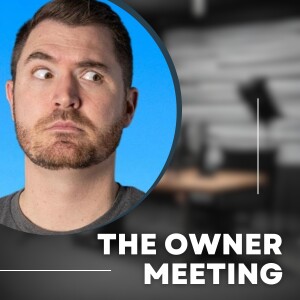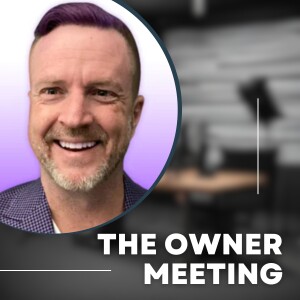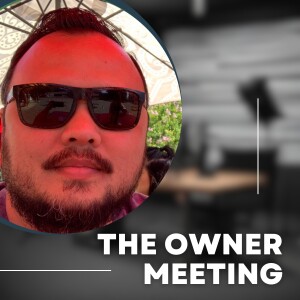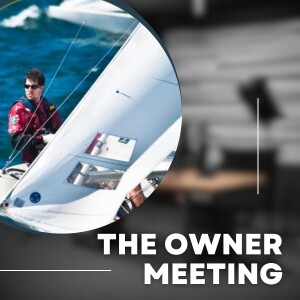The Owner Meeting
The owner meeting podcast meets with Real Estate and Business professionals who have built the businesses you want to own. Learn from the people who have already done the thing you want to do. Learn from their success and more importantly avoid the "Stupid Tax" they paid to get where they are today.
Join Christian Osgood as he explores the less known strategies of real estate investment and pave your way to financial freedom with the Owner Meeting Podcast. Christian is a real estate investor and an American entreprenur with over 400 rental properties, The Robin Hood Resort, Apex Asset Management LLC, Funnel Stacking LLC, and Coaching Closers LLC. All Purchased with a wopping $0 out of pocket. Join Christian and a network of real estate masters as they divulge priceless insights, innovative financial tactics, and triumph tales to empower you in the dynamic realm of real estate investment. Whether you’re a seasoned player or an aspiring beginner, our podcast furnishes practical wisdom to expedite your journey towards prosperity and autonomy. Tune in now to kickstart the construction of your empire! Fresh episodes released weekly, make sure to SUBSCRIBE!”
Episodes

Tuesday Sep 02, 2025
How Shane Turned ADUs into $300K+ Plays: Free Land & Condo Tricks
Tuesday Sep 02, 2025
Tuesday Sep 02, 2025
In this episode Shane Sanders explains a niche West Coast strategy: buy single‑family homes or duplexes on large corner or alley lots, build two detached ADUs, then use condo conversions (or state code workarounds) to sell or finance units separately. He breaks down costs, loan mechanics, and how his construction background lets him cut build costs and create large margins.Shane also shares lessons on tenant screening, team building, cashflow vs. scaling decisions, and practical advice for investors who want to implement ADUs in their markets.

Sunday Jul 27, 2025
Sunday Jul 27, 2025
In this engaging episode of the Owner Meeting Podcast, the host welcomes Matthew Wang, a successful programmer and real estate investor, as they dive into Matt's transformative journey from starting with single-family homes to scaling up to multifamily properties.
Recorded in person in Texas, Matt shares fascinating insights about his early days of house hacking in Berrien, Washington, and how it led him to a profound shift towards multifamily investments. With experiences ranging from managing roommates, tackling tenant challenges in shared living spaces, to efficiently supervising properties across various states, Matt unfolds his fast-paced real estate adventure.
Listeners will learn from his strategic moves, including the decision to invest remotely, the significance of secondary markets like Olympia, Washington, and how joining the Multifamily Strategy mentorship helped catapult his investment career. He also details his partnership ventures, including a significant deal in Texas, offering a clear view of how to scale effectively while managing potential hurdles.
This episode is a must-listen for anyone considering a leap into real estate investing, showcasing how passion, strategy, and guidance can lead to impressive growth and opportunities in real estate portfolios.

Tuesday Jul 15, 2025
From Hockey to Home Services: Adam's Journey to Entrepreneurial Success
Tuesday Jul 15, 2025
Tuesday Jul 15, 2025
Welcome to another engaging episode of the Owner Meeting Podcast. In this episode, host Christian welcomes Adam Chapman, an entrepreneurial expert in the home services sector. Join us as Adam shares his inspiring journey from playing professional hockey to leading a successful business in home services.Adam, the founder of Pad Pal, a thriving company that offers a wide range of home services, discusses how he transitioned from sports to entrepreneurship. He reveals the secrets behind his company's success, including the importance of simple, scalable businesses like window cleaning, gutter cleaning, and Christmas lights installation.Throughout the conversation, Adam emphasizes the value of building a reliable team and the power of strategic marketing. He also shares valuable lessons from his experiences, including the costly mistake of giving away company equity and the art of scaling a service business to new heights.In addition, explore Adam's passion for teaching others through Home Service U, where he guides aspiring entrepreneurs to replicate his success. This episode is packed with actionable insights and inspiration for anyone looking to break into the home services industry.Tune in for a blend of motivational stories and practical advice that can help you transform a simple business idea into a profitable venture.

Friday Jul 11, 2025
Navigating the Real Estate Storm: Insider Tactics for Success
Friday Jul 11, 2025
Friday Jul 11, 2025
Welcome back to Multifamily Strategy and the Owner Meeting Podcast with Christian and special guest Sam Prim. In this episode, they explore the dynamic changes in the real estate market over the past year, emphasizing the resilience needed to navigate the slowdowns in multifamily investments and the burst of the flipping and wholesaling business. Sam shares insights into his diversified portfolio, explaining how the single-family rental segment remains consistent due to effective systems and tenant retention strategies.
Delving deeper, the conversation uncovers Sam's business model, which integrates wholesaling, flipping, and multifamily investments, allowing for unique adaptability in volatile markets. Discover the journey of acquiring 42 single-family homes in a single transaction and the creative funding solutions implemented to ensure profitability. The episode also sheds light on pivotal decisions, both successful and costly, offering listeners valuable lessons in risk assessment and the pitfalls of expanding beyond one's core expertise.
Join us to gain practical advice from seasoned real estate investors, learn about the importance of finding deals and securing funding, and explore innovative tactics to thrive in the ever-evolving real estate landscape. Whether you're a newcomer or a seasoned investor, this episode provides essential strategies for sustainable growth.

Tuesday Jul 08, 2025
Unveiling Real Estate Success with Jacob Davenport
Tuesday Jul 08, 2025
Tuesday Jul 08, 2025
Welcome to the Owner Meeting Podcast, hosted by Chris, where he is joined by Jacob Davenport, an energetic and insightful real estate investor. In this episode, they delve into topics such as the significance of problem-solving in real estate, the importance of community, and the mindset needed to succeed in business.
Jacob shares his journey from facing personal challenges, including a period of incarceration, to becoming a successful real estate investor in Northern California. He discusses the power of patience, networking, and investing in others to achieve his goals. The episode also explores the importance of setting clear visions, building the right team, and overcoming obstacles with confidence.
Whether you're a seasoned investor or just starting out, Jacob’s story and insights provide valuable lessons on building a thriving real estate business without being overwhelmed by the pursuit of money alone. Tune in to learn how to leverage community, confidence, and a clear vision for long-term success.

Friday Jul 04, 2025
The Multifamily Crash is Finally Here: Insights from Michael Zuber
Friday Jul 04, 2025
Friday Jul 04, 2025
Join us in this exciting episode as we chat with Michael Zuber, a renowned expert in real estate investment and economic insights. Michael shares his journey from a traditional career path to building substantial multi-generational wealth through real estate. We delve into his straightforward and repeatable investment strategies that anyone can follow to achieve significant financial success.Discover the latest trends and forecasts in the real estate market, including the ongoing challenges and opportunities within the multifamily sector. Michael also opens up about his personal decisions behind relocating from California to Nevada and his thoughts on the current economic climate.Tune in to learn about the importance of cultivating a supportive community for wealth building, and how Michael’s innovative approaches are empowering investors everywhere. Whether you're a seasoned investor or just starting out, this episode offers valuable insights and inspiration to help you navigate and prosper in the world of real estate investment.

Saturday Jun 21, 2025
From Single Family to Multifamily: Chris Jordan's Journey
Saturday Jun 21, 2025
Saturday Jun 21, 2025
Join us this week on the Owner Meeting Podcast as Chris sits down with real estate enthusiast Chris Jordan. Together, they delve into Chris Jordan's transition from acquiring single-family homes in Oklahoma City to recently closing a multifamily deal. Discover how he found the opportunity, overcame financial roadblocks, and structured his partnership. With anecdotes about market dynamics and landlord experiences, this episode is a treasure trove of insights for budding investors. Whether you're interested in tapping into the Oklahoma market or keen on learning from his ventures, this episode is one you won't want to miss!

Friday Jun 13, 2025
Friday Jun 13, 2025
Welcome to the Owner Meeting Podcast, hosted by Christian and his good buddy, Phil Toth. Phil's journey from professional rugby player to Olympic sailor, and now a successful real estate investor, showcases his versatile talents and determination. This episode delves into Phil's incredible story, including his recent venture into real estate with the purchase and transformation of a 10-plex property in Pennsylvania.Learn about Phil's unique path, from his athletic triumphs to fixing up a slum property, increasing its value and improving resident life. He shares valuable insights on project management, networking, and the importance of aligning goals with objectives. Discover the impact of community and mentorship as Phil navigates the multifamily real estate world, illustrating the importance of perseverance and strategic investment decisions. Join us as we explore Phil's dynamic career and the lessons he's learned along the way.

Friday Mar 21, 2025
From Prison to Profit: How This Investor Turned a Jail into Luxury Rentals!
Friday Mar 21, 2025
Friday Mar 21, 2025
Most people are looking for safe, easy real estate deals. Matt Hawkins does the opposite.
This high-level investor saw an abandoned prison and turned it into luxury rentals, a kids' playground, and housing for disabled veterans.
In this episode, Matt shares:🔥 How he built a massive portfolio with ZERO partners🔥 Why he has 30-year fixed loans at 4% interest🔥 The best way to find unique investment opportunities🔥 How to scale and manage real estate while working a full-time job
If you’re tired of the same old advice, this is the episode for you.
🔹 Timestamps:0:00 – "If You Can See Him, You Can Be Him" (Why Role Models Matter)0:22 – Meet Matt Hawkins: The Investor Who Does The Impossible1:12 – From High School Dropout to Real Estate Mogul2:00 – How He Bought a Jail and Turned It into a Profitable Business3:30 – Keeping the Prison Cells?! The Wildest Part of the Project5:04 – How He Negotiated an Insane Deal With The City6:55 – $200K Purchase, Millions in Value: Why This Worked8:42 – Creative Financing & Writing Your Own Loan Products10:26 – The Power of Delegation: Why He Runs a Lean, Profitable Team12:39 – Why Most People Stay Stuck & How to Break Free14:48 – How You Can Find Undervalued Real Estate Deals Like This16:35 – What’s Next for Matt & His Portfolio?

Friday Mar 14, 2025
The Biggest Mistake New Real Estate Investors Make (And How to Fix It!)
Friday Mar 14, 2025
Friday Mar 14, 2025
Want to build a profitable real estate business without getting stuck in never-ending projects? In this episode, Christian and his wife Danny break down the biggest mistake new investors make—and how to scale faster and smarter. We cover: ✅ Why underfunding renovations kills your cash flow (and how to fix it) ✅ The correct way to scope and budget before closing a deal ✅ The key to managing partners and investors (without drama) ✅ How to avoid getting stuck in long, drawn-out renovations ✅ The essential systems we use to manage hundreds of rentals Christian and Danny built their real estate empire together—this episode reveals their best-kept secrets for operating at the highest level.







